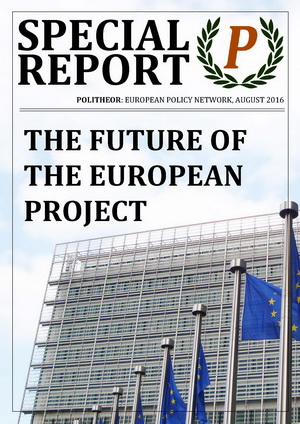[box type=”info” icon=”none”]Dr. Piers Ludlow is an Associate Professor at the International History Department of the London School of Economics and Political Science. His main research focus is the history of Western Europe since 1945, in particular the historical roots of the integration process and the development of the EU. In this interview he discusses
[box type=”info” icon=”none”]Dr. Piers Ludlow is an Associate Professor at the International History Department of the London School of Economics and Political Science. His main research focus is the history of Western Europe since 1945, in particular the historical roots of the integration process and the development of the EU. In this interview he discusses the causes of Brexit and the lessons to be learnt for the future integration process; European defence cooperation receives special attention. [/box]
 [box type=”info” icon=”none”]JT: Dr. Ludlow, Britain joined the EEC in 1973. Obviously, more than the name has changed since then; the EU grew to 28 member states, with Eastern enlargement alone accounting for 12 new members. After a decades-long membership a majority of 51.9 per cent of the British voters decided to leave the European Union. Looking at the structural environment, is this decision the result of changes having taken place at EU level within these decades or rather of a fundamental Euroskepticism right at the heart of the British EU debate ever since the country joined? [/box]
[box type=”info” icon=”none”]JT: Dr. Ludlow, Britain joined the EEC in 1973. Obviously, more than the name has changed since then; the EU grew to 28 member states, with Eastern enlargement alone accounting for 12 new members. After a decades-long membership a majority of 51.9 per cent of the British voters decided to leave the European Union. Looking at the structural environment, is this decision the result of changes having taken place at EU level within these decades or rather of a fundamental Euroskepticism right at the heart of the British EU debate ever since the country joined? [/box]
PL: My answer here would be very definitely both rather than one or other of the two factors – and indeed would be to highlight the interplay between the two. So it does matter that the EU of today is very different from the EEC that Britain joined in 1973, partly because today’s EU was perceived by many British voters as posing threats that were not present when Britain joined (or in 1975 when the first British referendum EEC membership was held), and partly because many British felt that such growth and change had happened without their consent. It is actually a myth that the EEC’s political dimension had not been mentioned in 1973 or 1975. There were plenty of references to the Community’s political dimension in the 1970s debates, even if most voters seem to have been more concerned with rather narrower issues such as the effect of EEC membership on food prices. But it is a myth that a large number of 2016 voters chose to believe, fuelling a widespread sense of having been duped.
The longstanding nature of British Euroskepticism also matters though. For a start there is a surprising degree of continuity between the arguments of the two referendum campaigns. A lot of the sovereignty arguments in 2016 were largely unchanged, for instance. Second, in 2016 the Leave campaigners did their homework on why they had lost last time around. They were thus much better at neutralizing the economic and business arguments that had helped sway the 1975 vote so decisively in favor of the pro-Europeans. Third, and most fundamentally, Britain’s early ambivalence about European membership, highlighted by the need to hold the 1975 referendum, helped frustrate the widespread assumption that Britain would effortlessly become a co-leader of the integration process alongside France and Germany. Instead, British leaders from Wilson through Thatcher to Cameron, gloried in their efforts to prevent European advance rather than taking pride in Europe’s successes. As a result no strong narrative about Europe’s success being British success ever emerged in British political discourse, despite the fact that many of Britain’s strategic priorities – from the Single Market through to Eastern enlargement – actually came to pass. Instead ‘Europe’ came to be seen as something driven forward by other countries’ priorities and liable to evolve further in directions uncongenial to British interests without British leaders being able to stop this happening. The very limited outcomes of Cameron’s ill-conceived attempt to ‘renegotiate’ British membership only played into this analysis. The Prime Minister had tried to shape Europe in Britain’s interest and had been incapable of achieving very much.
[box type=”info” icon=”none”]Can the British leave turn out to be a chance for the remaining 27 to propel European harmonization projects Britain so far knew how to obstruct? Deepening the European defense cooperation, for example, has been put on the agenda in the aftermath of Brexit.[/box]
The idea of a fuite en avant, of reacting to trouble by accelerating rather than hitting the brakes, has a long history in the European integration process and it was hence unsurprising that there were some calls for this in the immediate aftermath of the British vote. But I would be surprised were there to be many immediate concrete instances of the EU dashing ahead rather than standing firm. Few of Europe’s leaders seem either to want or to be in a position to lead a dramatic march towards much greater integration in the immediate future. The challenge instead is to consolidate what has already been achieved. Having said this there are some areas where, in the medium term, the 27 without Britain may well be able to agree more easily than was the case when the British were members. Defense cooperation might be one area; banking union another. But this will probably be gradual advance, not a bold leap forward.
[box type=”info” icon=”none”]Brexiteers have argued that deepening the European defense cooperation was simply unnecessary as NATO was the central peace-keeping institution in Europe. Others argue that in the last decades safety requirements have changed dramatically through global terrorism and cyber-warfare. Does Europe’s security architecture require a much higher degree of information- and burden-sharing compared to today’s standard? [/box]
The security challenges now confronting Europe will go on requiring more than just NATO. The Atlantic Alliance still matters of course, not least because of the glaring gap between US military capabilities and those of most European states. But total reliance on the US makes much less sense now than it did during the Cold War era. The US is less interested in European affairs and as such a less reliable guarantor (and will become even less reliable were Trump to be elected in November); there are more EU countries uncomfortable with total reliance on NATO; and many of the potential new threats are not amenable to the type of protection that NATO is able to provide. So Europe’s need to provide more of its own security will continue post-Brexit. The challenge though will be replacing the military capabilities and the expertise that the British provided, since this was one area where, behind the scenes if not always in public, the UK had become an important player in the collective European debate. Other countries, and perhaps the FRG in particular, will need to increase their capabilities so as to make up for Britain’s withdrawal.
[box type=”info” icon=”none”]If a fuite en avant is unlikely, what else can the EU do to prevent a cascade of further exit-endeavors?[/box]
I think the risk of contagion was always massively over-stated. Britain has had a problem with European integration ever since the process began in the 1950s. That it has now voted to leave the EU is thus much more a reflection of its own long-standing ambivalence than a portent of how other countries are likely to behave. Yes, Brexit will weaken certain aspects of the EU and is a disappointment to all of those who believed in a more united Europe. But it is neither the first nor the worst crisis that the EU has confronted. Indeed it is a much less real crisis in many ways than the migration crisis. So I remain largely optimistic about the EU’s medium term prospects. European integration emerged because of a desire to prevent further internecine European conflict, an underlying economic interdependence between the countries of Europe, and their shared realization that individually none of them were big enough to matter on the world stage. None of these underlying realities has been altered by the British decision. It hence stands to reason that Europe’s leaders will continue to want to cooperate closely with one another. In the process they will of course have to prevent populist opponents from hijacking the political debate. There are thus lessons that need to be drawn from Cameron’s mistakes, just as there are lessons to be learnt from the current state of US domestic politics. But while tactical changes will need to be made in order to respond to the populist challenge, I don’t envisage a major alteration in the underlying strategy.
[box type=”info” icon=”none”]What are the lessons to be learnt for the future development of European integration?[/box]
What will have to change is the position that European leaders adopt in talking to their national audiences about the integration process. The Brexit story is above all a story of how a political elite failed to convince the wider population that European integration brought more gains than costs. And this was not a failure confined to the two or three months of campaigning prior to the June 23, 2016 vote. Instead it was a failure that stretched back to 1973 if not earlier. Nor were the failings of the British elite wholly unique, although they were perhaps worse than most. As a result, Europe’s leaders will need to learn how to articulate more convincingly why they continue to believe that tight European cooperation is so needed and to resist the temptation to blame ‘Brussels’ for all that goes wrong, while claiming credit for all that goes well. Britain’s decision is not a cue for the rest of Europe to abandon all that it has been seeking to do or to change direction altogether. But it is a reminder that in democracies it is not enough for a political elite to share a conviction; such beliefs have to be ‘sold’ to the rest of the population too if future disasters are to be averted.













Leave a Comment
Your email address will not be published. Required fields are marked with *